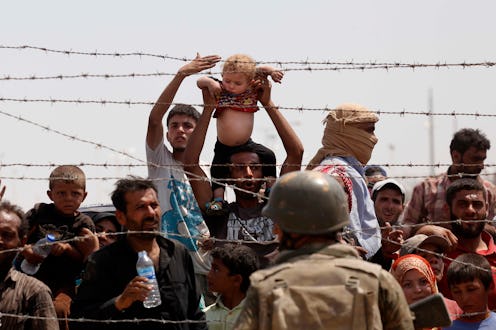News
Will European Union Keep Its Open Border Policy?
A massive refugee crisis has put the European Union's long-standing open border policy into question. Thousands of Syrian refugees are traveling through the Balkans and into Europe seeking safety and asylum. The EU has been unable to accommodate the sheer volume of people and have instead begun administering border checks in countries like Italy and Austria. Will the European Union keep its open border policy? It's difficult to say given just how many countries have opted into the Schengen zone.
The Schengen Agreement was signed by seven countries when it was first adopted in 1985 as a means to strengthen the EU by having no set internal borders. There are currently 26 countries that have signed on, including non-EU countries like Lichtenstein, Switzerland, Iceland, and Norway. (Hungary, Romania, Ireland, and the U.K. are currently not part of the Schengen zone but still members of the EU.) What this means is that EU citizens and those visiting the country legally are allowed to move between countries in the Schengen zone without strict border checks, though those with temporary Schengen visas have a limited amount of time to do so.
Border restrictions have been implemented between Schengen countries in the past, though the checkpoints previously put in place have been far more temporary. The reason for previous checkpoints included major sporting events, as well as the observance of the 60th anniversary of D-Day. The Schengen Agreement stipulates that there can only be a maximum of just 30 days for border checks, however.
A home affairs spokesperson for German Chancellor Angela Merkel has praised the restrictions currently being implemented. The official, a German MP named Stephan Mayer, had this to say about the decision:
I am extremely pleased that these border controls between Italy and Austria are under way. That was the express wish of the Bavarian government, given the dramatic increase in asylum seekers and refugees in southern Bavaria.
Already, Germany says it expects to house 800,000 refugees this year. Merkel has requested that a quota system be implemented across the EU to better accommodate those seeking asylum and evenly distribute migrants based on country size and economy. According to data released by Frontex, in July alone, there were 102,342 migrants crossing from the Balkans into the EU, to say nothing of the hundreds of thousands more who have attempted safe passage via a series of Mediterranean and North African routes. Prominent EU members will be meeting on Friday in Luxembourg to discuss additional actions regarding the Schengen zone and how best to proceed given the current refugee crisis, which includes people fleeing from countries like Pakistan, Afghanistan, Eritrea, and Nigeria, as well as Syria.
